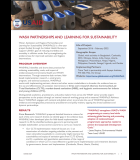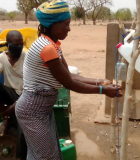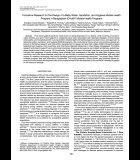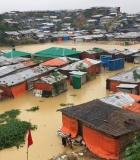Program for Strengthening Household Access to Resources (PROSHAR)
The food security situation in the targeted area of Bangladesh was critical at the point of project inception in 2010. Despite real wage growth in the previous five years leading to program initiation, a high rate of households, 31.5 percent, were in poverty. High food commodity prices, rising since 2007, exacerbated an already poor food security situation. Food insecurity at a national level was extremely high as measured by the Household Food Security Access Scale – at the beginning of 2011; the reported value was 69, a value more than double what was reported nearly two years later at the end of 2013.
Since May 2010, ACDI-VOCA has been implementing the United States Agency for International Development (USAID)-supported Title II Program for Strengthening Household Access to Resources (PROSHAR) project in three upazilas; Batighata, Lohagara and Sarankhola in Khulna Division of Bangladesh. The program is designed to “reduce food insecurity among vulnerable rural populations in selected upazilas in Khulna Division.” It has three strategic objectives (SOs) in the areas of income and access to food of poor and ultra-poor households (SO1), Health of pregnant and lactating women (PLW) and children under 5 (SO2), and disaster risk reduction (SO3), as well as a cross-cutting gender component.
Activity Description
- Introduced new crop varieties, provided training in appropriate production technologies, strengthened market actors to increase services related to quality inputs, and provided technical advice on bulk selling and purchasing to increase the incomes of poor and ultrapoor households
- Linked producer groups with the private sector and built the capacity of private NGOs to promote market linkages
- Promoted alternative income-earning opportunities, such as bamboo products (fish traps, baskets), karchupi (embroidery), and nakshikhata (hand-embroidered blankets)
- Trained government health workers, family welfare assistants, and skilled birth attendants in the community to strengthen their capacity to meet the needs of mothers and children
- Implemented care group trios, targeting fathers and mothers-in-law to support childhood nutrition and hygiene and reach community members with behavior change communication (BCC) interventions
- Mobilized communities to map their risks and resources, formed community-based disaster management volunteer groups, conducted disaster preparedness trainings, and prepared risk-reduction action plans
Expected Outcomes
- Increase income and access to food for poor and ultrapoor households
- Improve health of pregnant and lactating women and children under five (with particular attention to children under two)
- Help institutions and households prepare to respond effectively to shocks
Actual Outcomes
- Conducted refresher training on first aid and search and rescue for 256 Cyclone Preparedness Program (CPP) volunteers in Sarankhola
- 130 women leaders, who are also master trainers, purchased quality seeds from local sellers at 10 taka per packet and then resold these seeds at cost to 1,530 beneficiaries living in remote rural areas to improve rural women’s access to quality seeds and contribute to the economic and social empowerment of the women leaders.
- By endline, 38 percent of households have access to both water and a cleaning agent, compared to just 22.9 percent at baseline.
- At baseline, only 6.5 percent of all households were able to wash hands within 10 paces of the kitchen or cooking space; at endline, this increased to 17.6 percent.
- The prevalence of washing hands before preparing food increased from 37.6 of all households at baseline, to 67.8 percent at endline, an increase of 30.2 percentage points.
- There are improvements in the percentage of children using the toilet: 27 percent at endline versus 14.9 at baseline.





